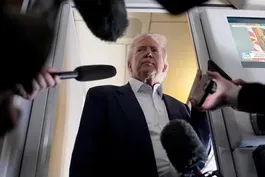
Tamara Keith and Amy Walter analyze Trump's first 100 days
Clip: 4/28/2025 | 8m 9sVideo has Closed Captions
Tamara Keith and Amy Walter analyze Trump's first 100 days
NPR’s Tamara Keith and Amy Walter of the Cook Political Report with Amy Walter join Geoff Bennett to discuss the latest political news, including analysis of the first 100 days of President Trump's second term, where he stands in polls and what’s ahead for Democrats.
Problems with Closed Captions? Closed Captioning Feedback
Problems with Closed Captions? Closed Captioning Feedback
Major corporate funding for the PBS News Hour is provided by BDO, BNSF, Consumer Cellular, American Cruise Lines, and Raymond James. Funding for the PBS NewsHour Weekend is provided by...

Tamara Keith and Amy Walter analyze Trump's first 100 days
Clip: 4/28/2025 | 8m 9sVideo has Closed Captions
NPR’s Tamara Keith and Amy Walter of the Cook Political Report with Amy Walter join Geoff Bennett to discuss the latest political news, including analysis of the first 100 days of President Trump's second term, where he stands in polls and what’s ahead for Democrats.
Problems with Closed Captions? Closed Captioning Feedback
How to Watch PBS News Hour
PBS News Hour is available to stream on pbs.org and the free PBS App, available on iPhone, Apple TV, Android TV, Android smartphones, Amazon Fire TV, Amazon Fire Tablet, Roku, Samsung Smart TV, and Vizio.
Providing Support for PBS.org
Learn Moreabout PBS online sponsorshipGEOFF BENNETT: For more analysis of the first 100 days of President Trump's second term and what's ahead, we turn now to our Politics Monday team.
That's Amy Walter of The Cook Political Report With Amy Walter and Tamara Keith of NPR.
It's good to see you both.
AMY WALTER, The Cook Political Report: Good to be here.
GEOFF BENNETT: So, Tam, we just heard Laura lay out the issues driving the first 100 days of President Trump's second term.
What stands out to you as you consider the president's agenda and his ability to execute it in this second go-round?
TAMARA KEITH, National Public Radio: Yes, so I spoke with a longtime adviser to President Trump who said that he's just more confident this time, that he knows how to use the levers of government and he's using them, and he kind of doesn't care about the consequences.
Yes, he is not happy about polls.
He has been complaining about his standing in the polls on his social media site, but he is barreling forward with policies, that the markets have indicated that the tariffs are a problem.
Voters, consumer confidence, there are loud flashing bright lights saying people are concerned about this.
But President Trump is moving forward with that.
And he also has shown, I don't think loyalty is the right word for it, but in his first term, he fired Michael Flynn, his national security adviser, very quickly.
In his second term, his national security adviser and defense secretary got tied up in Signalgate.
Neither of them were fired.
At this point, he's saying that, well, it seems like Pete Hegseth might figure it out or course-correct, but he's hanging on at least for now, at least through the 100-days mark.
So there is a -- there are differences.
And this adviser I talked to said, yes, he's been through knife fights before.
He knows what this is like and he's just more calm about it.
GEOFF BENNETT: Amy, Tam mentioned the polling.
A few weeks ago, Donald Trump was enjoying his highest approval ratings ever.
That has changed.
The polling averages, which we see on the screen there now, his numbers are in steady decline.
What stands out to you as you do a deeper dive into these numbers and this data?
AMY WALTER: Yes, his numbers now, which at one point were higher than they were in Trump 1.0, they were consistently higher as we went day-to-day comparing the first administration with the second, but now he's basically tied with where he was at this point in 2017.
I think the big picture answer to what has changed is that, while voters say they like the idea of disruption, they voted for a disrupter, they liked that, in practice, the disruption has been a little too much for them, especially on the economy.
As Tam noted, whether it's consumer confidence or opinions about Trump's handling of the economy, those are very pessimistic.
The other thing, when you look at some of these polls that ask, do you think his changes to the political and economic system have gone too far or not far enough, majority saying going too far.
Big picture as well as things, even on immigration enforcement, tariffs, cuts to the federal work force, and his approach to the presidency putting the nation at risk, that's a question that CNN asked, 57 percent of Americans agreed with that.
So I don't think that the door is closed for many of these voters on Donald Trump, essentially writing him off.
What they are saying is, yes, I wanted you to move fast and change things, but I'm not really getting the sense that this is working so well for me.
GEOFF BENNETT: And, Tam, with few exceptions, Donald Trump has not governed as someone who is especially responsive to public sentiment.
I mean, you could argue that they did recalibrate when the tariffs appeared to be a drag on the markets.
Based on your reporting, do you see the president or the administration taking any of this into account as they move forward?
TAMARA KEITH: Well, as I said, the president is certainly aware that his numbers are not in a good place.
And they have definitely in the past week been projecting, essentially to the markets, projecting negotiations are happening, there will be deals.
He's been very evasive about whether he's having conversations with China or not.
GEOFF BENNETT: And China says they have had no conversations.
TAMARA KEITH: China says they have had no conversations.
He keeps trying to imply that conversations are happening in the face of that.
And all of that is about trying to find an exit ramp from the very steep tariffs that, in the case of China, are essentially just an embargo.
No goods are moving, and back to school could end up being challenging or Christmas could end up being challenging if those ships don't leave at some point.
So they are certainly looking for an exit ramp.
At the same time, the president still really believes in tariffs.
And so that's the challenge is, he wants something.
He needs a win.
They haven't figured out how to get a win.
We are now a month into liberation day-month.
And they don't have any deals yet to show for it.
GEOFF BENNETT: Meantime, Democrats, to include Governor J.B. Pritzker, you have got Kamala Harris, Senator Elissa Slotkin of Michigan, they are all delivering what they have billed as major speeches this week pegged to the 100-day milestone.
AMY WALTER: Yes.
GEOFF BENNETT: But they're also, one imagines, trying to take advantage of President Trump's polling numbers.
Do you see an opening there for Democrats?
AMY WALTER: Well, and they're also taking advantage of a leadership vacuum.
This is what happens in this country when you're the party out of power.
There's no designated opposition party leader.
So, especially now, everybody's trying to flood in to be that opposition leader.
It's also a great opportunity to sort of float, not just your own name, but maybe your own stamp on issues or policies or what it should look like to be the opposition to Donald Trump.
Now, what we see today is this idea of fighting Donald Trump is taking hold, in part because this is what a lot of the base voters want.
But thinking about it for 2028, again, this will always... GEOFF BENNETT: A lifetime way.
AMY WALTER: ... which is a lifetime way, just to say that the importance of an issue or a style in 2025 does not necessarily translate to 2028.
All of this to say is, if you think that the way that these Democrats are presenting themselves now is setting themselves up for assured victory in a Democratic primary, I think you need to just hold back for a minute, but what they're channeling is this anger and frustration.
Certainly, J.B. Pritzker said at a speech this weekend in New Hampshire this idea that we need to basically take to the streets, fight Donald Trump and fight the Republicans at every turn is something that you're going to start to hear from a lot of Democrats at this moment.
Don't know what it will look like three years from now.
GEOFF BENNETT: And what are your Democratic sources telling you about this moment?
TAMARA KEITH: Yes, I actually -- the thought I had, and I'm sorry, it's not about my Democratic sources.
But if you go back to 2013, 2014, Ted Cruz and Marco Rubio were the shining bright tariffs, going to Iowa.
They were going to be the Republican, the next generation.
They were going to be the future of the Republican Party.
And then something dramatic changed.
Donald Trump arrived.
And it completely upended what the Republican Party thought it was going to be.
You now see Ted Cruz, in addition to still being a senator, having a popular podcast that's very pro-Trump.
And you see Marco Rubio, as secretary of state, in many ways, sublimating his views that he expressed while he was a senator to get right behind Donald Trump and put his policies forward on the world stage.
So a lot can happen.
GEOFF BENNETT: Indeed.
Tamara Keith and Amy Walter, thanks so much.
We appreciate it.
AMY WALTER: You're welcome.
TAMARA KEITH: You're welcome.
Breaking down the first 100 days of Trump's 2nd term
Video has Closed Captions
Clip: 4/28/2025 | 8m 39s | Breaking down the first 100 days of Trump's 2nd term and the effects of his agenda (8m 39s)
A Brief But Spectacular take on motherhood
Video has Closed Captions
Clip: 4/28/2025 | 3m 41s | A Brief But Spectacular take on motherhood as a master's in soft skills (3m 41s)
Children who are citizens deported with mothers, lawyers say
Video has Closed Captions
Clip: 4/28/2025 | 4m 47s | Children who are U.S. citizens deported along with foreign-born mothers, attorneys say (4m 47s)
News Wrap: Massive power outage hits in Spain and Portugal
Video has Closed Captions
Clip: 4/28/2025 | 7m 34s | News Wrap: Massive power outage disrupts daily life in Spain and Portugal (7m 34s)
People with disabilities discuss impact of Medicaid cuts
Video has Closed Captions
Clip: 4/28/2025 | 10m 19s | People with disabilities explain how Medicaid cuts could impact their lives (10m 19s)
Russia offers temporary ceasefire, Ukraine wants longer deal
Video has Closed Captions
Clip: 4/28/2025 | 5m 26s | Russia offers short-term ceasefire as Ukraine demands immediate, lasting peace (5m 26s)
White House touts first 100 days of immigration crackdown
Video has Closed Captions
Clip: 4/28/2025 | 3m 9s | White House touts aggressive immigration crackdown in Trump's first 100 days (3m 9s)
Providing Support for PBS.org
Learn Moreabout PBS online sponsorshipSupport for PBS provided by:
Major corporate funding for the PBS News Hour is provided by BDO, BNSF, Consumer Cellular, American Cruise Lines, and Raymond James. Funding for the PBS NewsHour Weekend is provided by...


















